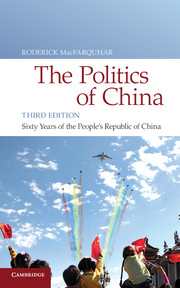Book contents
- Frontmatter
- Contents
- Tables and Maps
- Preface
- Abbreviations
- Introduction
- Chapter 1 The establishment and consolidation of the new regime, 1949–1957
- Chapter 2 The great leap forward and the split in the Yan'an leadership 1958–1965
- Chapter 3 The Chinese State in crisis, 1966–1969
- Chapter 4 The succession to Mao and the end of Maoism, 1969–1982
- Chapter 5 The road to Tiananmen: Chinese politics in the 1980s
- Chapter 6 Reaction, Resurgence, and Succession: Chinese Politics since Tiananmen
- Chapter 7 Dilemmas of globalization and governance
- Appendix Leaders and Meetings
- References
- Index
- References
Chapter 1 - The establishment and consolidation of the new regime, 1949–1957
Published online by Cambridge University Press: 05 June 2012
- Frontmatter
- Contents
- Tables and Maps
- Preface
- Abbreviations
- Introduction
- Chapter 1 The establishment and consolidation of the new regime, 1949–1957
- Chapter 2 The great leap forward and the split in the Yan'an leadership 1958–1965
- Chapter 3 The Chinese State in crisis, 1966–1969
- Chapter 4 The succession to Mao and the end of Maoism, 1969–1982
- Chapter 5 The road to Tiananmen: Chinese politics in the 1980s
- Chapter 6 Reaction, Resurgence, and Succession: Chinese Politics since Tiananmen
- Chapter 7 Dilemmas of globalization and governance
- Appendix Leaders and Meetings
- References
- Index
- References
Summary
An overview
When the People's Republic of China (PRC) was formally established on 1 October 1949 the nation's new leaders faced daunting problems. Society and polity were fragmented, public order and morale had decayed, a war-torn economy suffered from severe inflation and unemployment, and China's fundamental economic and military backwardness created monumental impediments to the elite's goals of national wealth and power. Yet by 1957 the leaders of the Chinese Communist Party (CCP) could look back on the period since 1949 with considerable satisfaction. A strong centralized state had been established after decades of disunity, China's national pride and international prestige had grown significantly as a result of fighting the world's greatest power to a stalemate in Korea, the country had taken major steps on the road to industrialization and achieved an impressive rate of economic growth, the living standards of its people had made noticeable if modest progress, and the nation's social system had been transformed according to Marxist precepts in relatively smooth fashion.
- Type
- Chapter
- Information
- The Politics of ChinaSixty Years of The People's Republic of China, pp. 6 - 86Publisher: Cambridge University PressPrint publication year: 2011
References
- 4
- Cited by

